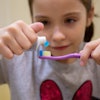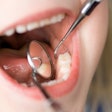
Caregivers who refuse to have their children immunized are also likely to refuse fluoride treatments for them, citing concerns about the safety of topical fluoride, according to a new study published in the American Journal of Public Health (July 2014, Vol. 104:7 pp. 1327- 1333).
Donald Chi, DDS, PhD, an associate professor in the department of oral health sciences at the University of Washington School of Dentistry in Seattle, studied the rates of topical fluoride refusal based on dental records and caregiver self-reports for children younger than age 18 who were seen in three Washington state dental clinics during 2009 or 2010. More than 1,000 caregivers or parents were mailed a survey that evaluated the association between immunization and topical fluoride refusal. A total of 361 surveys were completed and included in the analysis.
Dr. Chi's study reported that parents who refused immunization for children under their care were 60% more likely to refuse topical fluoride treatment for their children than caregivers who had their children immunized.
“Tooth decay can lead to toothaches, missed school, and poor grades. It's a major public health problem.”
"Tooth decay is the most common chronic disease in children," affecting more than 40%, Dr. Chi stated in a press release. "It can lead to toothaches, missed school, and poor grades. It's a major public health problem."
Dr. Chi defined the topical fluoride refusal rates, which ranged from 4.9% to 14.6%, as being high. If these percentages were applied to the population as a whole, even the lower end of the scale would translate to more than 3.6 million children who would not be receiving evidenced-based preventive dental care, he stated. He did note that the refusal of topical fluoride was not as high as the immunization refusal rate, which was 27.4%.
In the study, caregivers who were younger than 36 years old were more likely to refuse both immunizations and fluoride treatments compared with caregivers who were 51 years and older. Also, caregivers who had completed four or more years of college were more likely to refuse treatment than those with a high school education or less. Those caregivers of children identified as white had a significantly greater prevalence of immunization refusal than caregivers of non-white children.
Reasons for refusal
Why did caregivers refuse this topical fluoride treatment? In the study, half of the caregivers said they were concerned about the safety of fluoride.
Dr. Chi wrote that 70% of caregivers who refused fluoride reported their child "as having had a history of dental caries," so treatment refusal was likely not related to a low perceived risk of dental disease. Other potential reasons for refusal included a lack of cooperation by children, a belief that topical fluoride is ineffective, an inability to pay among those who are uninsured, and social norms, he noted.
Dr. Chi suggested that future research should focus on identifying the behavioral and social determinants of fluoride refusal, with an emphasis on the reasons why caregivers refuse topical fluoride. There may be a link between preventive medical and dental care decision-making among caregivers, which may reflect their religious, philosophical, or behavioral etiologies, he noted.
Looking at the issue in more depth, Dr. Chi also speculated that if immunization refusal increased, it may lead to similar increases in fluoride refusal. This potential refusal may place additional burden on the healthcare system, including increased childhood disease rates, reduced benefits associated with herd immunity, and potential widening of health disparities, he noted. This should be accounted for when planning disease prevention strategies for children, he advocated.



















